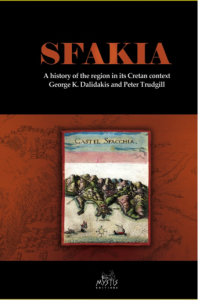 About the book, from the back cover:
About the book, from the back cover:
On the rugged and remote coast of southwest Crete, the fiercely proud and independent people of Sfakia have survived millennia of invasions by many of the world’s most aggressive and dominant civilisations. This book describes the lives of the indomitable and warrior-like Sfakian people as they struggled to thrive among and against the major Empires of Europe – Hellenic, Roman, Arab, Byzantine, Venetian and Ottoman – and to oppose the German occupation during World War II. With a rich detailing of the oral history of the region and of information gleaned from years of meticulous archival research, this book captures the spirit of the Sfakian people who have mastered its deep gorges, high plateaus and awe-inspiring mountains.
This comprehensive historical account is written for people with an interest in Sfakia and its turbulent past, and in particular for Sfakians and Cretans of the diaspora who are not able to access Greek language history books and research that deals with this subject.
About its authors:
George K. Dalidakis, after a long career in financial management, has been focussing his interest on the history of Crete and in particularly of Sfakia, where his paternal ancestry lies – he is related to the Gialedakis family from Askifou. He has been a frequent visitor to Crete and Sfakia for more than 10 years, and he has
been researching his family background and the history of Sfakia during that time. George is the author of the book Αναζητώντας τις εκατό εκκλησίες της Χώρας Σφακίων (Searching for the one hundred churches of Chora Sfakion), based on research into the local tradition that the village once had one hundred churches. George has also published online a number of articles relating to Sfakia that can be accessed at www.dalidakis.com
Peter Trudgill is an English academic linguist who has written books and papers on the dialectology and sociolinguistics of many languages, including Greek.
He has been visiting Crete for over 30 years, and has been to Sfakia more than 80 times. Peter is the author of In Sfakia: Passing Time in the Wilds of Crete, which was written with his wife Jean Hannah and published by Lycabettus Press (Athens) in 2008. The Greek translation Στα Σφακιά: Ανακαλύπτοντας την ψυχή της Κρήτης appeared in 2013 from the same publisher. A German translation In der Sfakia: Geschichte und Geschichten – unsere Zeit im wilden Kreta was published by Balistier in 2011.
About the book, by one of the co-authors, George K. Dalidakis:
This book offers much more than the history of Sfakia, as it gives an account of Crete from the prehistoric period up to the civil war following WWII, and sets the district’s rich history within the context of events that occurred in the broader area, both in Crete but also in the eastern Mediterranean. The book focuses on Sfakia during periods when the region was at the centre of dramatic events on the island, such as some of the bigger uprisings against the Ottoman Empire, as well as on other eras that have made Sfakia such a unique place in Crete.
The book is intended for two main audiences. First, we wrote this for the regular visitors to Crete and the district who want to learn more about Sfakia’s past. Second, we had in mind the many Cretans and Sfakians of the diaspora, and especially those of the second and third generation, who do not have access to the source materials that we used or who have difficulty reading Greek. We have been aware of this dual need, since we have been frequent visitors to Sfakia for many years and have often been asked questions about the history of the area by tourists and Cretans who live abroad.
Ten years ago Peter Trudgill and I decided to research and write a book that would address this need, without realising how big the task was going to be. After eight years of research and writing, one year seeking a publisher, and another in production with Mystis Editions, we finally have in our hands a hard copy of the book that we dreamed about some ten years ago. The book was officially launched in Sfakia on the 3rd of October and in Chania on the 5th of October.
Although this is a long book, some 300 pages plus an extensive bibliography and index, we believe that it is easy to read and not a dry academic text. We believe that this book will make a serious contribution towards the better understanding by regular visitors to Sfakia of its people, their past and their traditions, which have all been influenced by the region’s extraordinary past, and will thus encourage them to visit the district more frequently and with a deeper appreciation of the area. Similarly, we hope that the more recent generations of Sfakians of the diaspora will be inspired by the achievements of their ancestors against great adversity, as outlined in this book, to visit the land of their ancestors.
As our aim has always been to promote the district, our remuneration as authors has been donated to the Sfakian Association of World-wide Sfakians who are based in Athens.
Book details:
Publisher Mystis Editions, Heraklion, Crete
ISBN 978-618-5024-41-3
Price € 14.90
Can be ordered online at:
Book Review by a frequent visitor to Sfakia and Crete, journalist Denis Coghlan
For those visitors who know and love the physical beauty of Sfakia, with fissured mountains falling into the sea, fertile plateaus and olive trees, corbelled mitatoes, coastal pathways, high altitude walks and distant goat bells, this great sprawling book provides a different perspective, concentrating on the local inhabitants: where they came from, their culture, pride and independence and the roles their forefathers played in resisting a succession of occupying powers.
Straddling the seaways of the eastern Mediterranean, Crete – a fertile island in the wine-dark sea – was always regarded as a geopolitical prize and drew acquisitive eyes. In pre-history, settlers from Anatolia brought ceramics and farming techniques and provided the basis for the emergence of a sophisticated Minoan civilisation. Its eclipse and the rise of Greek city-states followed, to be superseded by Roman conquest. From there, Arabs, Byzantines, Venetians and Turks ruled the island with varying degrees of brutality before it achieved unity with Greece in the last century. Germany wrested the island from the Allies during the Second World War, but encountered fierce local resistance. Liberation opened the door to civil war and Cretan blood flowed once again in the White Mountains.
The details are all there in this book, shocking, brutal and, on occasion, controversial. Individuals and extended families play their parts. And, as with many choices in times of war, decisions based on a cold calculation of certain defeat are frequently regarded by others as treachery. Personal jealousies and in-fighting amongst Sfakian leaders – sometimes affecting rebel allies from other districts – was a recurring feature down the centuries, leading to failed up-risings and the destruction of communities. And while folklore views the Turkish occupation of the island as being particular brutal, it was relatively benign when compared to Venetian rule.
Because of the mountainous terrain and an absence of roads – it was 1952 before Chora Sfakion was linked by asphalt to the outside world – the region was particularly suited to guerrilla warfare. In the 17th century, an Italian cartographer scrawled ‘ Popoli Bellicosi’ across those inaccessible mountains. The inhabitants were, indeed, belligerent and didn’t take kindly to taxation, external law or administrative interference. A hundred years later, that manifested itself in the Anopoli-based, Daskalogiannis-led uprising against the Turks. His statue stands in the plateia there and the event is commemorated through the name of the ferryboat that serves the Samaria Gorge. British agent Xan Fielding wrote “The Fortress” when describing his exploits with Cretan fighters in the White Mountains in the 1940’s.
Over the centuries, the locals developed a reputation for lawlessness, raiding and theft. A number of Turkish armies, sent to impose control, were practically wiped out as they returned northward. Small bands of local sharpshooters controlled the mountain passes and the slaughter in the gorges was immense. Even today, Cretans from the fertile lowlands regard their mountainous neighbours with a cautious reserve.
As the title makes clear, this book places Sfakia in its Cretan context, from the earliest times to the present day. It considers language and settlement patterns; cultural evolution, changing lifestyles, relative prosperity and scorched earth destruction. Transport was by sea and when danger threatened, people fled into the mountains or sought refuge on the island of Gavdos. Particular emphasis has been placed on uprisings, rebellions and guerrilla campaigns involving local families, some of whom trace their lineage to the Byzantine settlement, following the expulsion of the Arabs in 1092. Extensive detail is provided in connection with battles, bloody ambushes and official retribution.
For those visitors from northern countries who dream about sun-filled days and Greek hospitality in the mountains and tavernas overlooking the Libyan sea, this book offers an understanding of the circumstances and privations that shaped the lives of their hosts.
